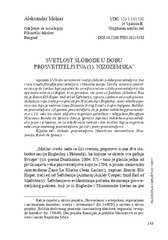Приказ основних података о документу
Svetlost slobode u dobu prosvetiteljstva, deo 1 - Nizozemska
The light of freedom in the age of enlightenment, Part 1: The Netherlands
| dc.creator | Molnar, Aleksandar | |
| dc.date.accessioned | 2021-10-12T11:14:24Z | |
| dc.date.available | 2021-10-12T11:14:24Z | |
| dc.date.issued | 2011 | |
| dc.identifier.issn | 0353-5738 | |
| dc.identifier.uri | http://reff.f.bg.ac.rs/handle/123456789/1143 | |
| dc.description.abstract | U članku se razmatra značaj slobode za doba prosvetiteljstva, kao i veze između filozofije prosvetiteljstva i liberalne teorije. Štaviše, autorova centralna teza je da svetlost koja je počela da osvetljava razum u dobu prosvetiteljstva više nije imala ništa ni sa Bogom, ni sa prirodom, već samo sa ljudskom slobodom. Kao što je Entoni Ešli Kuper, treći erl od Šeftsberija, zapazio u jednom od svojih pisama, sloboda je svoje svetlo prvo prosula po Nizozemskoj i Engleskoj. Autor takođe osporava tezu koju je nedavno izneo Džonatan Irving Izrael u svojim knjigama Radikalno prosvetiteljstvo i Osporeno prosvetiteljstvo da je pokret radikalnog prosvetiteljstva u 18. veku bio skoro isključivo inspirisan političkom i religijskom filozofijom Nizozemca Baruha de Spinoze. Iako je Spinozin doprinos radikalnom prosvetiteljstvu jasan i evidentan, on se takođe može tretirati i kao mislilac koji je inspirisao neke struje umerenog prosvetiteljstva, pa čak i protiv-prosvetiteljstva. | sr |
| dc.description.abstract | The central topic of the article is the importance of the freedom for the Age of Enlightenment, as well as ties connecting philosophy of Enlightenment and political liberalism. Furthermore, the author's central thesis is that the light that began to enlightened the reason in the Age of Enlightenment had nothing to do with God or nature, but solely with human freedom. As Anthony Ashley Cooper, third Earl of Shaftsbury, noted in one of his letters, freedom shed the light on two countries at first: the Netherlands and England. The author is also disputing the thesis developed by Jonathan Irving Israel in his recent books Radical Enlightenment and Enlightenment Contested that the movement of radical Enlightenment in 18. century was almost exclusevly inspired by the political and religious philosophy of the Dutch Baruch de Spinoza. Although Spinoza's contribution to the radical Enlightenment is clear and evident, he could be also perceived as a thinker who inspired some currents of moderate Enlightenment and counter-Enlightenment as well. | en |
| dc.publisher | Univerzitet u Beogradu - Institut za filozofiju i društvenu teoriju, Beograd | |
| dc.relation | info:eu-repo/grantAgreement/MESTD/Basic Research (BR or ON)/179049/RS// | |
| dc.relation | info:eu-repo/grantAgreement/MESTD/MPN2006-2010/149029/RS// | |
| dc.rights | openAccess | |
| dc.rights.uri | https://creativecommons.org/licenses/by-nc-nd/4.0/ | |
| dc.source | Filozofija i društvo | |
| dc.subject | sloboda | sr |
| dc.subject | prosvetiteljstvo | sr |
| dc.subject | Nizozemska | sr |
| dc.subject | nacionalizam | sr |
| dc.subject | liberalizam | sr |
| dc.subject | Baruh de Spinoza | sr |
| dc.subject | the Netherlands | en |
| dc.subject | nationalism | en |
| dc.subject | liberalism | en |
| dc.subject | freedom | en |
| dc.subject | enlightenment | en |
| dc.subject | Baruch de Spinoza | en |
| dc.title | Svetlost slobode u dobu prosvetiteljstva, deo 1 - Nizozemska | sr |
| dc.title | The light of freedom in the age of enlightenment, Part 1: The Netherlands | en |
| dc.type | article | |
| dc.rights.license | BY-NC-ND | |
| dc.citation.epage | 166 | |
| dc.citation.issue | 1 | |
| dc.citation.other | 22(1): 143-166 | |
| dc.citation.rank | M51 | |
| dc.citation.spage | 143 | |
| dc.citation.volume | 22 | |
| dc.identifier.fulltext | http://reff.f.bg.ac.rs/bitstream/id/136/1140.pdf | |
| dc.identifier.rcub | https://hdl.handle.net/21.15107/rcub_reff_1143 | |
| dc.type.version | publishedVersion |

